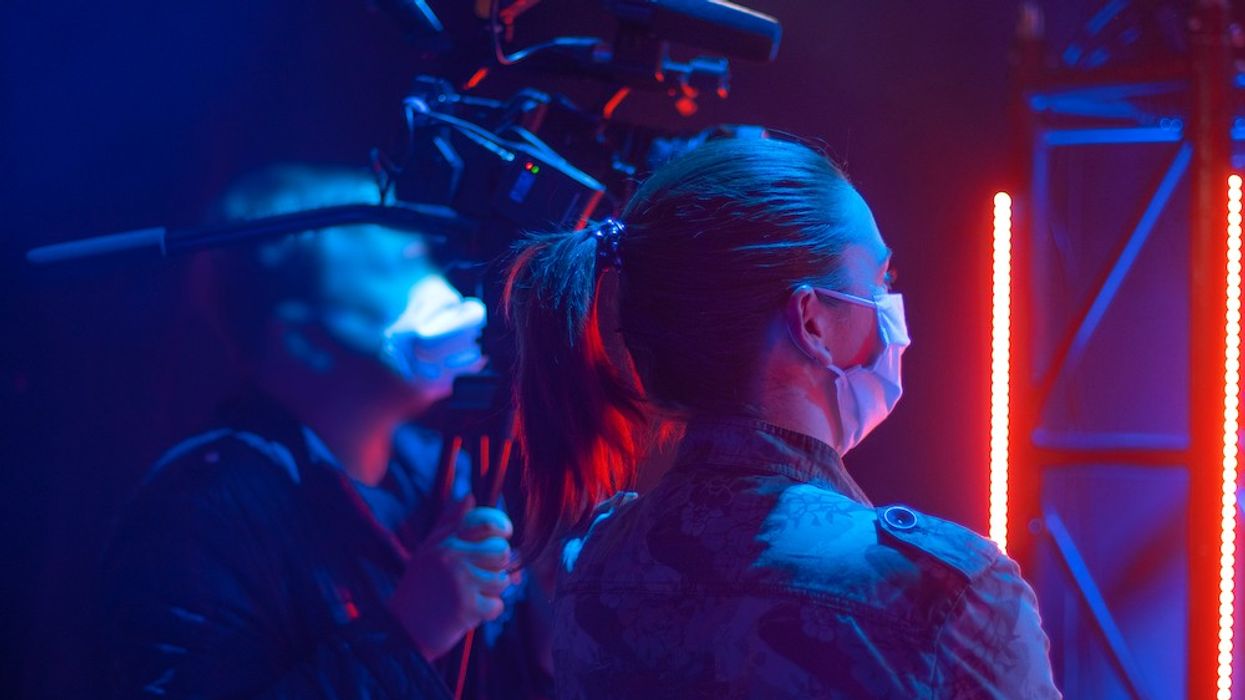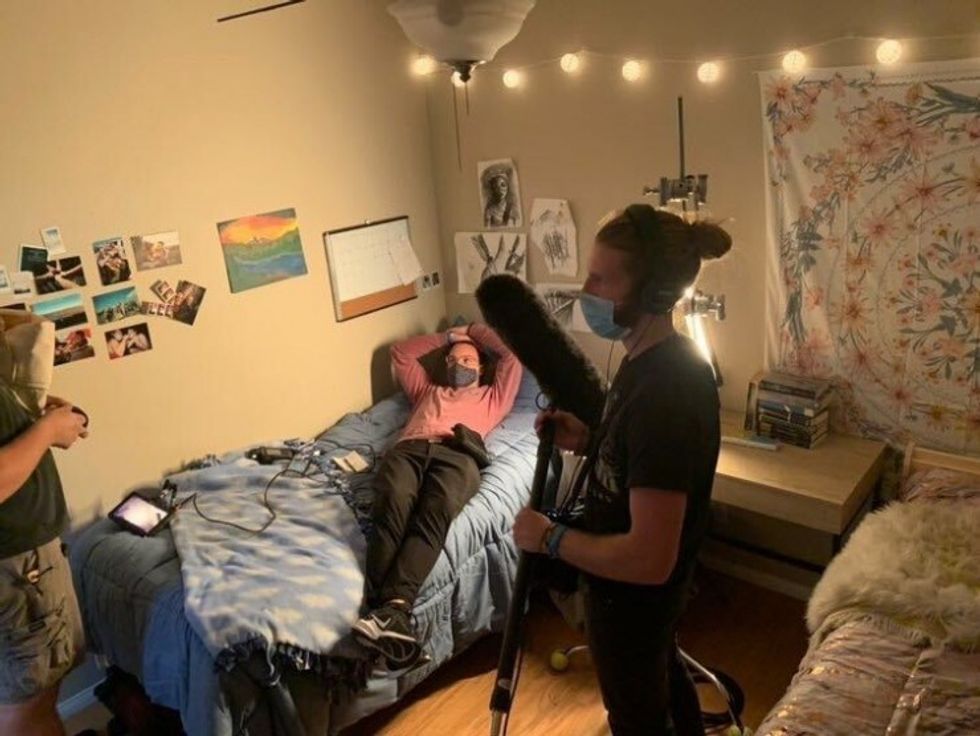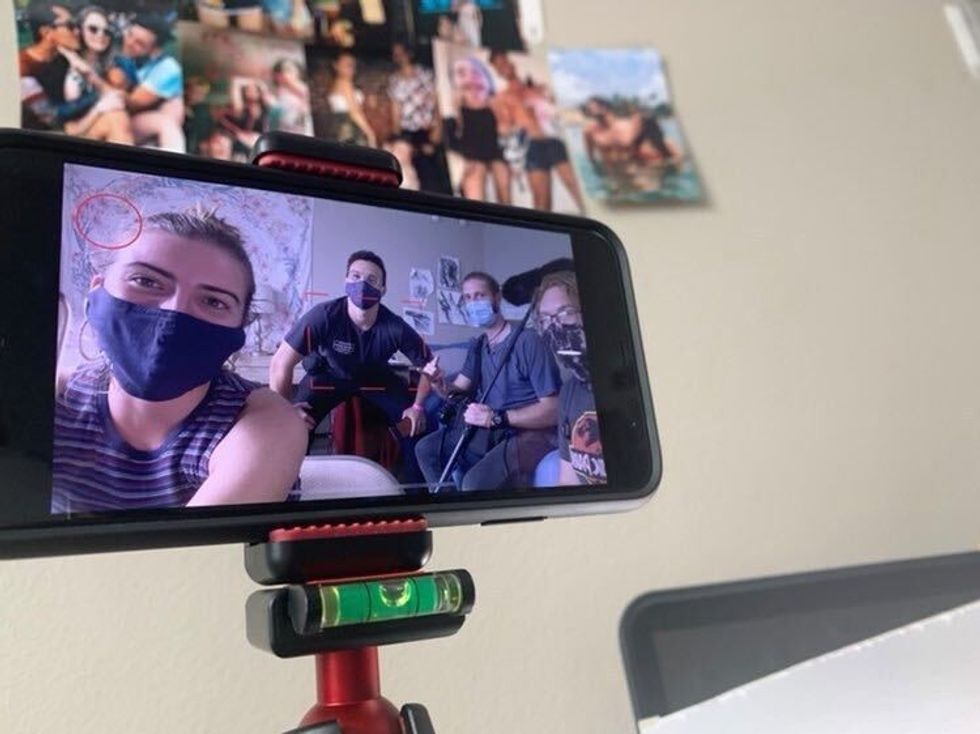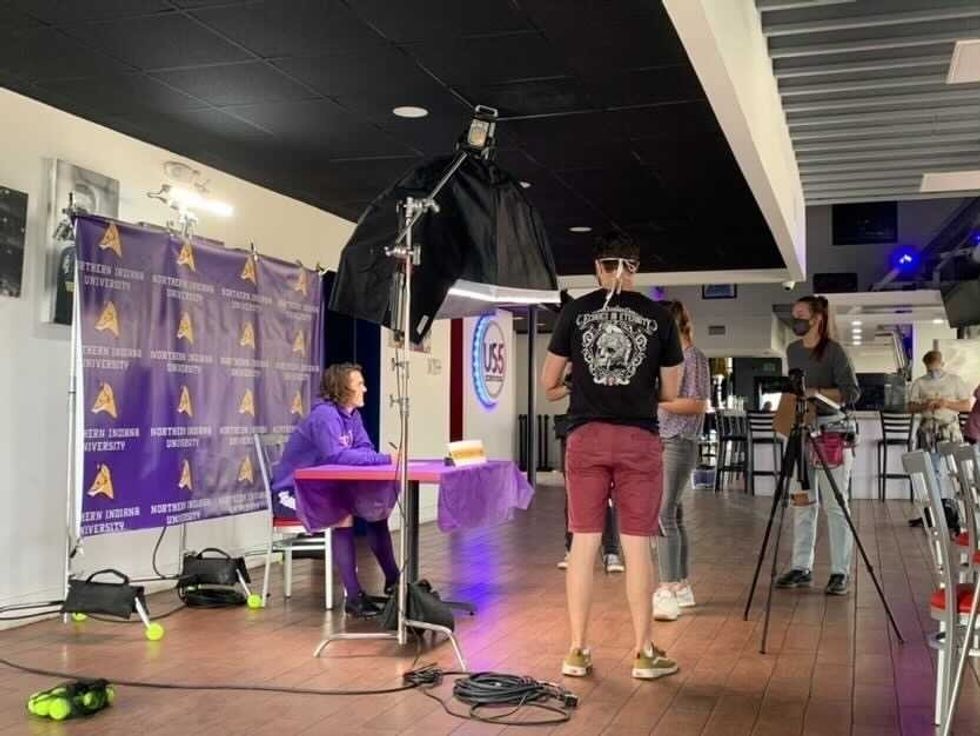Explore Hollywood's Newest On-Set Job, the COVID Officer
The COVID-19 pandemic has changed everything—especially the way things are run on a film set.

2020 went downhill quickly after January. With the COVID-19 pandemic altering life as we know it, most industries suffered a harsh blow. Unfortunately, this meant that a lot of productions in Hollywood had to pause filming until further notice.
Adjusting to the new regulations posed by the CDC hasn’t been easy (or rid of error). After months of trying to figure out how the industry could continue business as usual, some productions have begun filming again under new restrictions. Through this new way of running a set, there’s been a new on-set position in Hollywood known as a “COVID Compliance Officer.”
This role has become crucial in the film world. Without it, productions would grind to a halt. Tom Cruise’s now-famous on-set COVID rant brought to light how high the stakes are on a film set during this time.
The responsibilities of a COVID Officer are rigorous. Making sure everyone on set is masked up and social distancing, along with sanitizing and cleaning every surface, is just a small piece of what these unsung heroes do for the film industry.
No Film School got to sit down with first-time COVID Officer Maxwell Klaiber about his experience on the set of a film that uniquely adapted to the times we’re living in.
Explore a day in the life of a COVID Compliance Officer.

NFS: So you were a COVID officer on a production recently. What project was that?
MaxwellKlaiber: There were two productions that I helped out with COVID-related material. But the main production that I helped on as COVID officer was a feature film, directed and written by my friend Anna Matz, called Love You Anyway which is starring Reign Edwards and Charlie Gillespie.
NFS: And how did you get the COVID Officer job on that set?
Klaiber: I helped out the COVID Officer as a production assistant on another set about a month ago. I did a lot of cleaning tasks along with my regular PA duties. I learned the proper way to clean a set and do cleaning tasks. On the most recent set, it was a lot of not only cleaning the set and the locations that we were at but also the coordination for testing. I did not become an official COVID officer until the recent set because you have to take a course. It’s kind of like schooling. You have to do the course to become an official COVID Officer so you can perform the duties accurately.
NFS: How exactly did you get the job for the feature film?
Klaiber: So I was in talks with the producer who is a friend of mine, and they asked me if I knew anything about being a COVID Officer. And I told them that on the last film that I was on, I was very much in cahoots with the COVID Officer and COVID Coordinator of that set. They showed me the ropes on what filming in the COVID era looks like, and they just taught me so much.
So when they asked do you know anything COVID-related, I told them I did. I was just taught a handful of material on how to best do COVID-related stuff on another film set. When I was doing the course, a lot of it was rehashed information that I learned from the previous set. There was just a lot of stuff to get. I had to obtain the right paperwork and the official documentation to perform COVID-related duties on a set.

NFS: No Film School wanted to give our readers a look into the day in the life of certain people on set. Can you give me a rundown of your day from waking up to going to bed? What did your day look like as a COVID Officer?
Klaiber: Let me try and rationalize this as much as possible into a single day. Let's just say a single day on set that I had to be at a location at 8 a.m., and technically everyone's call time for the cast and crew was 8 a.m. But for me, my call time was roughly around 7:30. I wanted to be there about 30 minutes before everyone arrived at that specific location on that day because what I would do in those 30 minutes was sanitize the set that I knew was going to be used for our actors.
In that half-hour, I was also setting up my check-in table. So, I would set up a table for people to check in, and I created a document with COVID-related questions that were given to us by our course about checking in everyone who was going to be on set. And they had to fill out a form before they arrived at my table. Once they arrived at my table, I asked if they filled out the check-in information that was emailed to them by our first aid the night before. Hopefully, and usually, they said they filled it out immediately before they came to set. My job at the table is to double-check to make sure all the information is correct.
And then I gave them a color-coordinated wristband, which was to ensure that I knew as well as everyone else on set that they were checked in and they were safe. I checked their temperature to make sure that they were not running a fever. So basically before anyone steps foot on set, they have to confirm with me that their paperwork is filled out and they are not running a fever.
Throughout the day, I would continue to check in people as they arrived, whether it was extras or people who came in later for a specific job. I was also making sure that I was disinfecting any high touchpoint areas like tabletops rails or anything else that had a lot of hand contact. On top of that, I made sure that everyone was safely social distancing, as well as keeping their masks on, except for the performers. The performers were allowed to take their mask off only in the act of performing. Immediately after their scene was done, they would put their masks back on and we would continue social distancing.
That was my day-to-day life as a COVID officer on top of testing, but testing is a very different process in addition to just day-to-day life on a set, keeping everyone safe from COVID.

NFS: In a few sentences, what did testing look like? How were you involved in that? How did you collect tests?
Klaiber: Every set is very different based on budget, of course. For the budget that we were working with on our feature, the production company that we were working for took care of the cost of the test. We were given PCR tests about three to four days before our first day of shooting so that our tests could be sent to the lab/vendor that was working for our specific shoot. Our production company partnered with a lab/vendor that was helping conduct and do the tests for our cast and crew on set. So before production even started, we were given these tests, and everyone tested negative. Therefore everyone was cleared for the first day of shooting.
So tests usually take 24 to 48 hours to do, so you have to keep in mind that you should have a test roughly 48 hours before a shooting day or something for that person. Then the results are good for the next seven days.
However, with CDC guidelines, SAG specifically follows guidelines for their union. If they're regulars on set, they are tested three days a week. So we had six shooting days in a row, two break days, and then another six shooting days in a row. So in those six shooting days, we had to be tested every other day. The lab we worked with, called Inspire, would come onto the set that specific testing day that I scheduled and conduct PCR tests for everyone on set, and they would test all the cast and all the crew. Then by the next day, we would have results for who tested negative, who tested positive.
So I was not involved in the actual testing of people as a COVID Officer. But what I was in charge of was elaborating the location, time, and the place where our vendor and our lab can do the tests and then working with them as well as our team to find the best time and the best way to test everyone.
NFS: That sounds stressful.
Klaiber: It's very stressful, because you're worried about the overall health and wellbeing of the entire set. If someone tested on a Monday, we know for a fact that we don't get back the test results until maybe late Tuesday evening. So I was on set that next day stressing out waiting to see what the lab was going to say. Because if we were getting a 4 p.m. shot and at 5 p.m., our lab told us one of our grips tested positive for COVID, I have the liability and morality to shut down the set for the rest of the day and to reassess the shooting schedule because of the positive COVID test. It's a nail-biter every single day because you're waiting for the test results to come back, even in the midst of filming. So, it's very stressful.
NFS: That brings me to my last question, which I feel like you have touched on throughout this interview. But what would you say is the most challenging part of the job?
Klaiber: The most challenging part of the job is most assuredly making sure that every extra, every actor, every person who is visiting the set, cast and crew, has been tested efficiently and is negative for the virus.
It's a lot of bookkeeping in the sense of just making sure that everyone's testing at the right time and that they're testing within the right timeframe so that their tests last for the time that they need to be on set. Keeping track of everyone's testing schedule and making sure that the tests are done correctly and that they are arriving at the lab on time and being received back on time is much more challenging than the day-to-day cleaning.
Honestly, in my opinion, I think sets should be cleaned the way that we've been cleaning them specifically in the pandemic day in and day out because it's very sanitary. It's healthier. It leaves a clean presence for the next person who might be coming in to use it, whether it's a house, whether it's a set or even a park, wherever set and rotation that you're using, we are making sure that that place is clean for the next person. And I think that that should be a new and welcoming activity that sets do going forward, even post-pandemic

 'Anora'Neon
'Anora'Neon Annie Johnson Kevin Scanlon
Annie Johnson Kevin Scanlon









